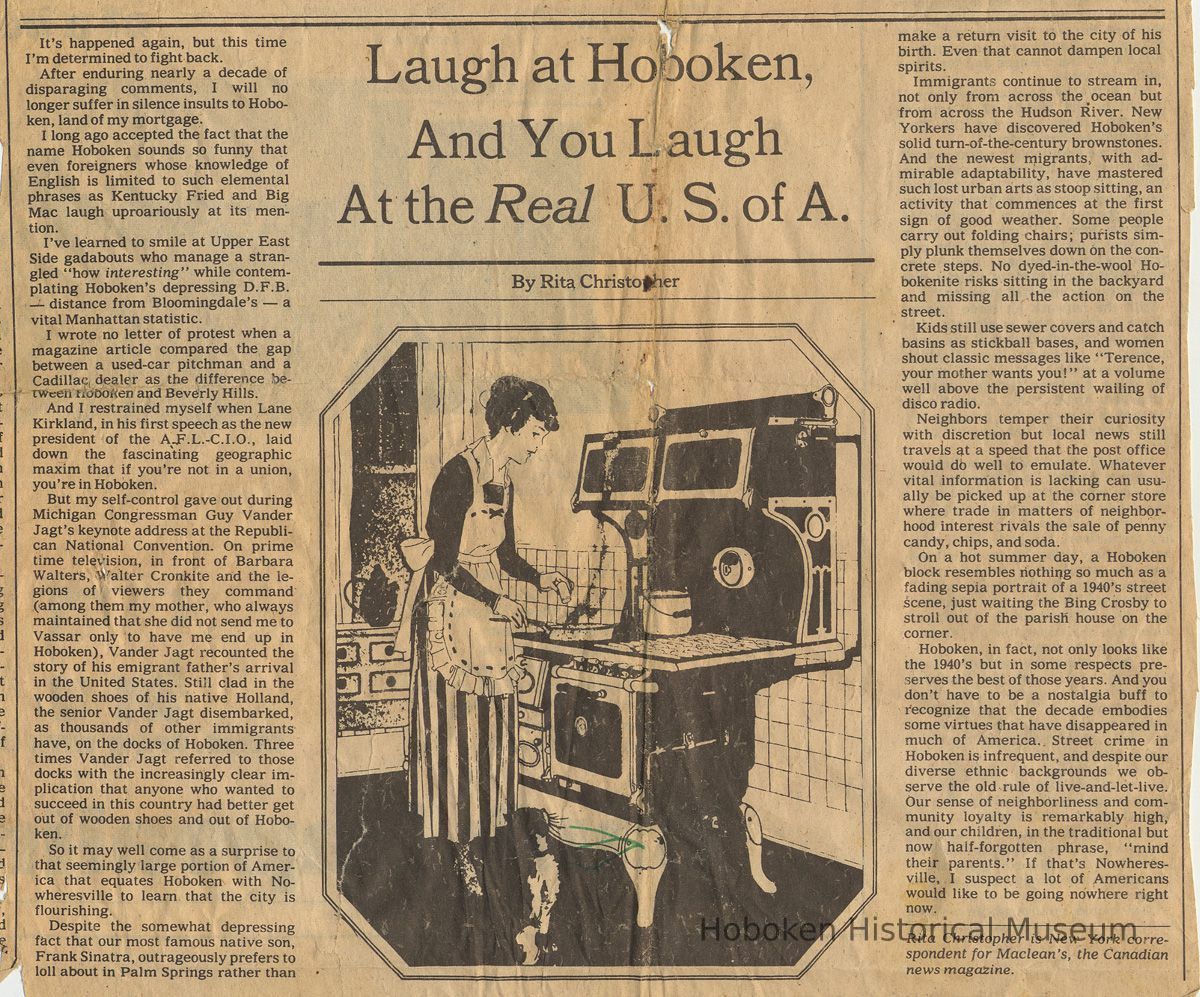Article: Laugh at Hoboken, and You Laugh at the Real U.S.A. By Rita Christopher. Jerusalem Post (NYT, Op-Ed), Aug. 17, 1980.
2011.018.0002
2011.018
Katz, Florence
Gift
Gift of Florence Moses Katz
1980 - 1980
Date(s) Created: 1980 Date(s): 1980
Fair
Notes: Op-Ed article by Rita Christopher as published in The New York Times, Sunday, August 17, 1980 and reprinted in facsimile in The Jerusalem Post, Weekly Review, n.d., ca. late August 1980. Laugh at Hoboken, and You Laugh at the Real U.S.A. It's happened again, but this time I'm determined to fight back. After enduring nearly a decade of disparaging comments, I will no longer suffer in silence insults to Hoboken, land of my mortgage. I long ago accepted the fact that the name Hoboken sounds so funny that even foreigners whose knowledge of English is limited to such elemental phrases as Kentucky Fried and Big Mac laugh uproariously at its mention. I've learned to smile at Upper East Side gadabouts who manage a stran- gled "how interesting" while contem- plating Hoboken's depressing D.F.B. distance from Bloomingdale's - a vital Manhattan statistic. I wrote no letter of protest when a magazine article compared the gap between a used-car pitchman and a Cadillac, dealer as the difference be- tween zioboken and Beverly Hills. And I restrained myself when Lane Kirkland, in his first speech as the new president of the A.F.L.-C.I.O., laid down the fascinating geographic maxim that if you're not in a union, you're in Hoboken. But my self-control gave out during Michigan Congressman Guy Vander Jagt's keynote address at the Republi- can National Convention. On prime time television, in front of Barbara Walters, Walter Cronkite and the le- gions of viewers they command (among them my mother, who always maintained that she did not send me to Vassar only to have me end up in Hoboken), Vander Jagt recounted the story of his emigrant father's arrival in the United States. Still clad in the wooden shoes of his native Holland, the senior Vander Jagt disembarked, as thousands of other immigrants have, on the docks of Hoboken. Three times Vander Jagt referred to those docks with the increasingly clear im- plication that anyone who wanted to succeed in this country had better get out of wooden shoes and out of Hobo- ken. So it may well come as a surprise to that seemingly large portion of Amer- ica that equates Hoboken with No- wheresville to learn that the city is flourishing. Despite the somewhat depressing fact that our most famous native son, Frank Sinatra, outrageously prefers to loll about in Palm Springs rather than [right column ] make a return visit to the city of his birth. Even that cannot dampen local spirits. Immigrants continue to stream in, not only from across the ocean but from across the Hudson River. New Yorkers have discovered Hoboken's solid turn-of-the-century brownstones. And the newest migrants, with ad- mirable adaptability, have mastered such lost urban arts as stoop sitting, an activity that commences at the first sign of good weather. Some people carry out folding chairs; purists sim- ply plunk themselves down on the con- crete steps. No dyed-in-the-wool Ho- bokenite risks sitting in the backyard and missing all the action on the street. Kids still use sewer covers and catch basins as stickball bases, and women shout classic messages like "Terence, your mother wants you!" at a volume well above the persistent wailing of disco radio. Neighbors temper their curiosity with discretion but local news still travels at a speed that the post office would d6 well to emulate. Whatever vital information is lacking can usu- ally be picked up at the corner store where trade in matters of neighbpr- hood interest rivals the sale of penny candy, chips, and soda. On a hot summer day, a Hoboken block resembles nothing so much as a fading sepia portrait of a 1940's street Scene, just waiting the Bing Crosby to stroll out of the parish house on the corner. Hoboken, in fact, not only looks like the 1940's but in some respects pre- serves the best of those years. And you don't have to be a nostalgia buff to recognize that the decade embodies some virtues that have disappeared in much of America. Street crime in Hoboken is infrequent, and despite our diverse ethnic backgrounds we ob- serve the old rule of live-and-let-live. Our sense of neighborliness and com- munity loyalty is remarkably high, and our children, in the traditional but now half-forgotten phrase, "mind their parents." If that's Nowheres-ville, I suspect a lot of Americans would like to be going nowhere right now. Rita Christopher is New York correspondent for Maclean's, the Canadian news magazine. Status: OK Status By: dw Status Date: 2011-03-28



